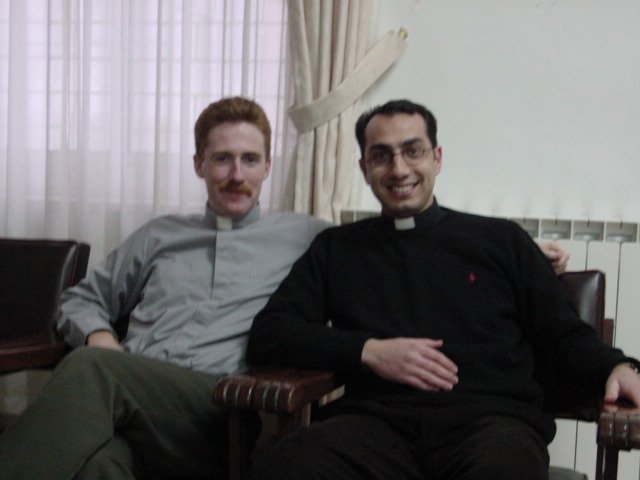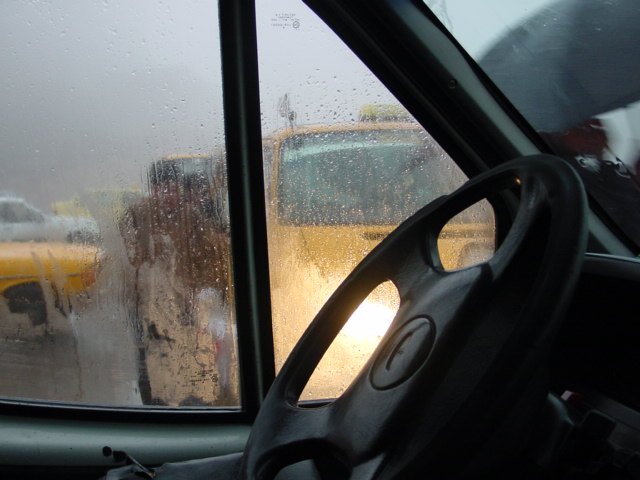February 13, 2003
The cassette, which promised to be ready today, remains decidedly un-ready. Elizabeth headed back to Zababdeh via shared taxi. At the first checkpoint (Tamasiih), her car was refused entry because two of the passengers were West Bankers without special permission to travel on the Jordan Valley Road (as it runs through the West Bank). A couple hours later, at the last checkpoint (Hamra), two other passengers were refused entry because they had Jerusalem IDs. They had to leave the car, and either try to find another way in or return to Jerusalem. It's a Catch-22 commute - one checkpoint stops some, another stops the others. Jerusalemites are permitted to travel the Jordan Valley road, to enter Jerusalem, and even travel into Israel, but they are forbidden to enter the West Bank. It's as if residents of Chicago could enter Chicago, and cross into Indiana and other states, but were forbidden to go to the rest of Illinois. And Illinois residents were not permitted to leave the state, travel on some major highways, enter Chicago, or for some, leave their town. Hard to imagine. Even harder to live.
Palestinians would rather risk walking Surda road than driving.
Meanwhile Marthame slowly wandered over to Birzeit to visit friends we haven't seen since we lived there in the summer of 2001. When he arrived at the center of town, he noticed young men standing around the Al-Manara Circle staring down the street. He soon learned what they were looking at, a couple of Israeli jeeps a few hundred feet away, and decided to catch the shared taxi towards Birzeit. At that moment, people began to break into a run, though they soon returned to watching the jeeps. Marthame and the taxi were long gone at that point, making their way to Surda. Surda is the small village between Birzeit and Ramallah which has become the focus of road destruction and military activity. No army presence was around, as we've experienced in the past - instead, just pile after pile of dirt blocking the road. Most everyone chose to walk rather than ride in the few cars risking driving through that section of road. Apparently the soldiers like to play the game of hiding until a few cars go through, then reappearing and punishing the drivers who have been bold enough to drive on what was once called a road.
The thing that is so striking about this place where Israeli security has been put in place is that there is nowhere any potential attacker could go. There is one dirt road which cuts off over the hill to an Israeli military camp, but those who would drive between Birzeit and Ramallah could not physically go anywhere else along their way. It has also been the scene of non-violent protests, attempts to remove the roadblocks. And yet they remain.
Marthame eventually arrived in Birzeit and stopped by to visit with our old neighbors from our time in Birzeit. The father, thankfully, is working again in Ramallah, and travels there daily with some kind of special permission papers. Mom, however, originally from Zababdeh, hasn't visited Ramallah since the Intifada started. She hasn't been back to see her family in Zababdeh in three years. The youngest son is now in second grade, the middle son in sixth (and has become very active in his church - a bright, confident kid), the daughter in ninth, and the oldest son looking towards college. Since we've lived here, their house has been searched twice by the Israeli army, but they have remained well through it all.
Marthame and Fr. Iyad Twal, Catholic priest of Birzeit.
Marthame then went to visit with Fr. Iyad, the priest who kindly hosted us during our extended summer stay in 2001. They had a wonderful chance to catch up about the various goings-on in both Zababdeh and Birzeit. The Birzeit parish has progressed steadily in its relationship with National Presbyterian Church in Washington, DC, to the point that there will now be a Sunday in April designated not only Mission Sunday, but Birzeit Sunday. Fr. Iyad will preach at all three services. It is exciting to see this, and we are hoping that some of Zababdeh's fledgling relationships will similarly grow with time.
Disabled Palestinian taxis. The Israeli army had removed one tire removed from each.
After lunch and before darkness set in, Fr. Iyad drove Marthame back to the Surda side of the checkpoint. No sooner had they gotten in the car than it began to hail! Along the way, it lightened up. Luckily, Fr. Iyad had a spare (broken) umbrella in the car, and gave it to Marthame. No sooner had Marthame stepped out of the car and began the twenty minute walk to the other side than it started hailing again. There was nowhere to go but forward, so he trudged along, every layer of clothing getting progressively wetter with each step.
Pouring rain and crowded taxis on the Ramallah side of the Surda road.
He finally arrived to a waiting taxi on the other side, no wetter than if he had been swimming in his clothes. To the side of the road a number of cars were parked, a makeshift lot for Birzeit-Ramallah commuters. Each car, however, was missing one tire, and the tires were stacked in a neat pile. The soldiers had come a half hour before and systematically removed one tire from each of the cars, then left. Couldn't have seemed more arbitrary unless they had set fire to the pile. The hotel back in Ramallah had no dryer, so he wrung out his clothes and hung them in the shower and turned on the fan, hanging some of the wetter clothes on the radiator. It's cold here!
He then borrowed some clothes and he and our friend from the University went out into the cold (but not rainy) Ramallah night towards the Chinese restaurant. No one was out - perhaps everyone else had the sense to stay home out of the cold. The Chinese chef who used to work here has headed back to China; nonetheless, they've done a good job at approximating Szechwan. Maybe they'll open up one in Zababdeh...




